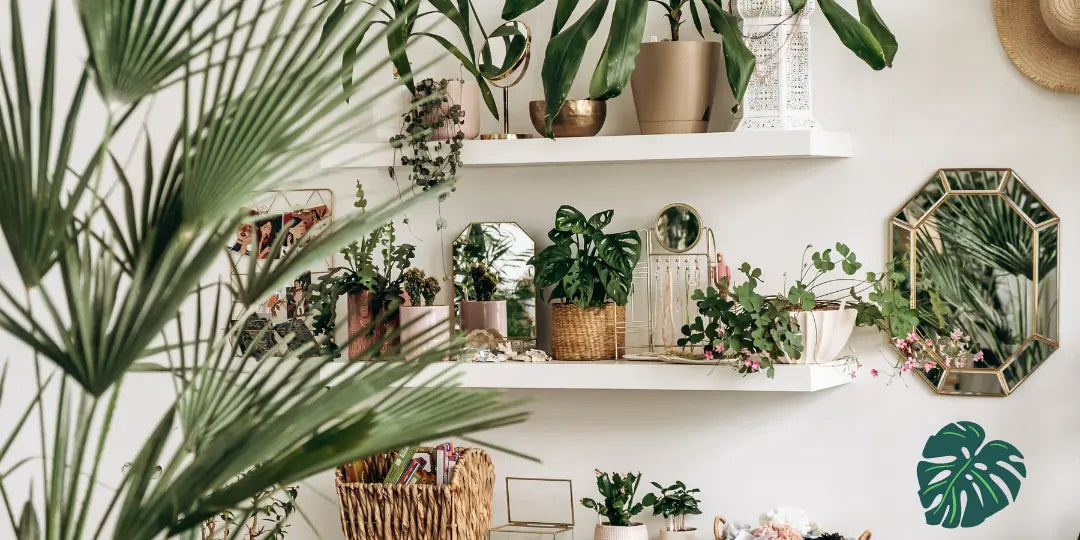Houseplants aren’t just pretty accents in our homes and offices. They play a crucial role in our well-being and overall health. Recent studies have shown that houseplants can purify the air, improve our mood, and even boost our immune system. This new perspective on natural everyday treatments might just convince you to add a few more pots to your home.
Key points to remember
- Houseplants purify the air by removing harmful toxins.
- They improve concentration and reduce stress.
- Green plants can boost the immune system.
- They add moisture to the air, which can be beneficial for the skin and respiratory tract.
- Studies show that plants can improve sleep quality.
Air purification by plants
One of the great benefits of indoor plants is their ability to purify the air. Some plants like English ivy ( Hedera helix ), saw palmetto ( Chamaedorea seifrizii ), and Boston fern ( Nephrolepis exaltata ) have the ability to remove harmful toxins from the air, such as benzene, formaldehyde, and trichloroethylene. These volatile organic compounds (VOCs) often come from common household products like cleaners, paints, and building materials.
A famous NASA study in the 1980s showed that these plants, among others, could remove up to 87% of toxins in just 24 hours. The researchers in this study used sealed chambers to demonstrate that plants could absorb these pollutants through their leaves and through microorganisms in their soil.
The effect of plants on concentration and stress
In addition to purifying the air, indoor plants also have a positive effect on our mental well-being. Several studies have linked the presence of plants to reduced stress, anxiety and depression.
A study conducted by the University of Hyogo in Japan found that the mere presence of plants on a desk could reduce stress levels among office workers. Participants who had plants on their desks showed significantly lower stress levels compared to those without plants.
In another strand of cognitive benefits, a study from the Royal College of Agriculture in Cirencester found that students had 70% more attention when taught in classrooms with plants. Plants help maintain a calm environment and reduce ambient noise, which aids concentration and productivity.
Strengthening the immune system with plants
Few people know that indoor plants can also play a role in strengthening the immune system. This ability is due in particular to the increase in humidity in the air and the release of phytoncides, volatile organic compounds of biological origin that have antimicrobial and antifungal properties.
Air humidity is often reduced in heated homes in winter, and certain types of plants such as ferns and palms help to add moisture to the air. This can be beneficial for the respiratory tract, preventing drying and irritation of the mucous membranes, which helps reduce infections.
Phytoncides released by certain plants have shown beneficial effects on the human body by stimulating NK (Natural Killer) cells, a type of white blood cell that plays a crucial role in defense against viral infections and tumors.
The contribution of plants to air humidity
As mentioned earlier, many houseplants help to increase humidity levels in the room, which is especially beneficial in winter when central heating can make the air significantly drier. Ferns, for example, can add a significant amount of moisture to the air, which helps to maintain healthy skin and respiratory tracts.
Plants such as Sansevieria trifasciata (mother-in-law's tongue) and Spathiphyllum (moonflower) are particularly effective at increasing humidity. In addition to helping prevent skin irritation and dryness of the respiratory tract, these plants also help reduce fatigue and headaches often associated with low humidity levels.
Improving sleep quality with plants
Better sleep quality is another sometimes overlooked benefit of indoor plants. Some plants, such as jasmine and lavender, are known for their calming properties and ability to reduce anxiety. They release aromas that promote relaxation and deep sleep.
Additionally, the snake plant ( Sansevieria trifasciata ) is unique in that it releases oxygen at night, unlike most plants that do so during the day. Having a snake plant in the bedroom improves nighttime air quality, which can lay the foundation for more restful sleep.
By incorporating these plants into your sleep space, you can not only enjoy the relaxing aroma, but also benefit from better air quality, leading to deeper, more restful rest.
Plants as decorative elements and their psychological impact
Beyond their physical and mental benefits, houseplants also serve as decorative elements that can transform a living space. A visually pleasing environment has an undeniable positive effect on our mood and comfort level.
Plants like succulents, cacti, and spider plants (Chlorophytum comosum) are often selected for their unique aesthetics and ability to fit into different decorating styles. Plus, these plants are relatively easy to care for, making them a great choice even for those without a green thumb.
The green colors and organic shapes of plants create a sense of peace and tranquility. By introducing plants into your space, you bring a bit of nature indoors, which can have a profound impact on your satisfaction and well-being.
The Best Houseplants to Improve Your Health
There are a number of plants that are known for their health benefits. Here are some of the best indoor plants that you can bring into your home to improve your well-being:
- English ivy : Excellent for removing toxins and mold from the air.
- Boston Fern : Known for its ability to humidify the air.
- Sansevieria trifasciata : Releases oxygen at night, ideal for bedrooms.
- Spathiphyllum : Helps reduce mold and improves air quality.
- Lavender : Reduces anxiety and improves sleep quality with its relaxing aroma.
- Jasmine : Excellent for promoting restful sleep.
- Chlorophytum comosum : Known for its ease of maintenance and its purifying properties.
How to choose and care for your indoor plants
Choosing the right plants for your home is essential to maximize their benefits. Here are some tips to help you make the right choices:
Choosing plants that are suited to your environment
Before selecting plants, it is important to consider your home's environment. Some plants require a lot of light, while others can thrive in low light. For example:
- Plants like ficus and palm require a lot of light.
- Plants like mother-in-law's tongue and pothos can grow in low light areas.
Then choose plants according to your specific needs
Think about the benefits you’re looking for. If you need to purify the air, opt for plants like Chlorophytum comosum ; if it’s increased humidity that concerns you, add ferns or palms to your home.
Care tips to optimize the benefits
- Watering: Follow a watering schedule that is appropriate for each type of plant. Some require frequent watering, while others prefer drier soil.
- Light: Make sure each plant receives an adequate amount of light. Rotate pots regularly so that all sides of the plant receive light.
- Fertilizer: Use appropriate fertilizers for each type of plant. In general, indoor plants need more nutrients during their active growth period.
- Humidity: Consider using a humidifier or placing bowls of water near plants to maintain good humidity levels, especially in winter.
Most Frequently Asked Questions
Do houseplants require a lot of maintenance?
No, some houseplants like succulents and Sansevieria require very little maintenance.
Which indoor plants are best for purifying the air?
Plants like English ivy, Chlorophytum , and Spathiphyllum are known for their air purifying abilities.
Is it possible to have indoor plants in a room without windows?
Yes, some houseplants can thrive




